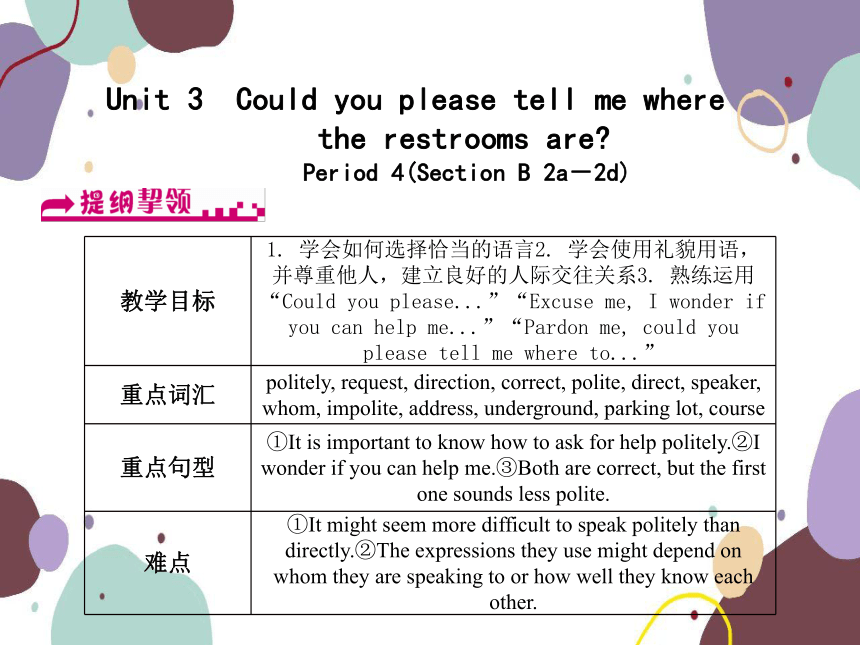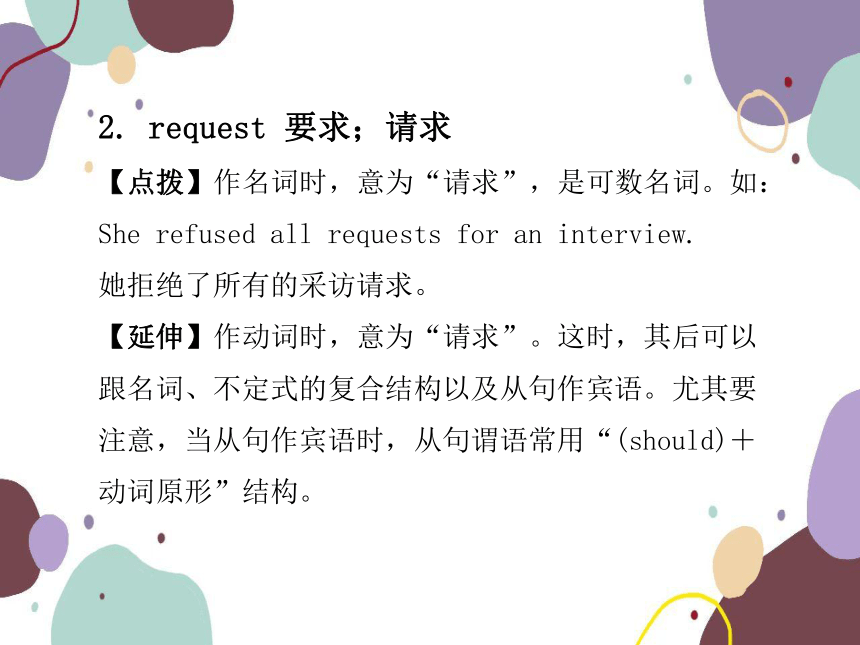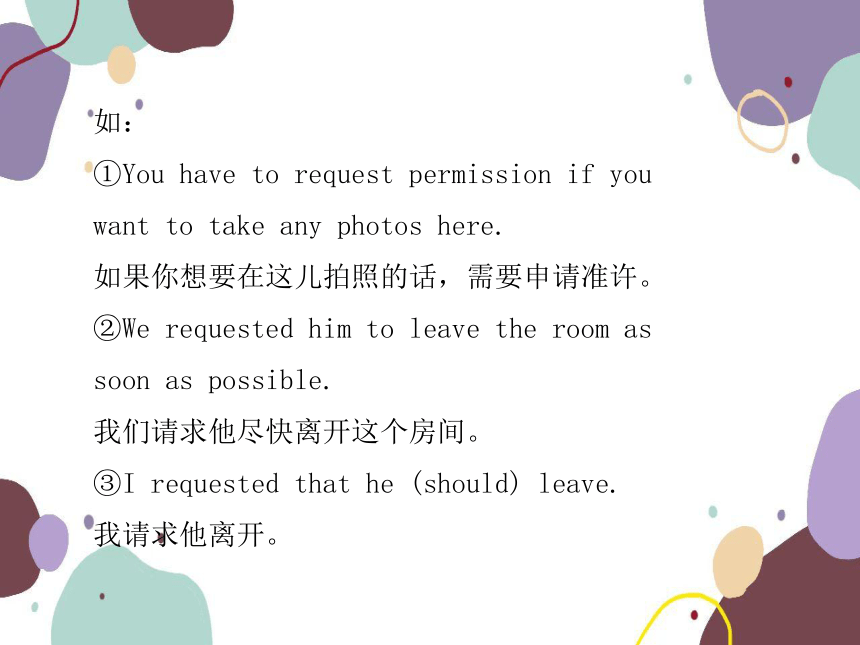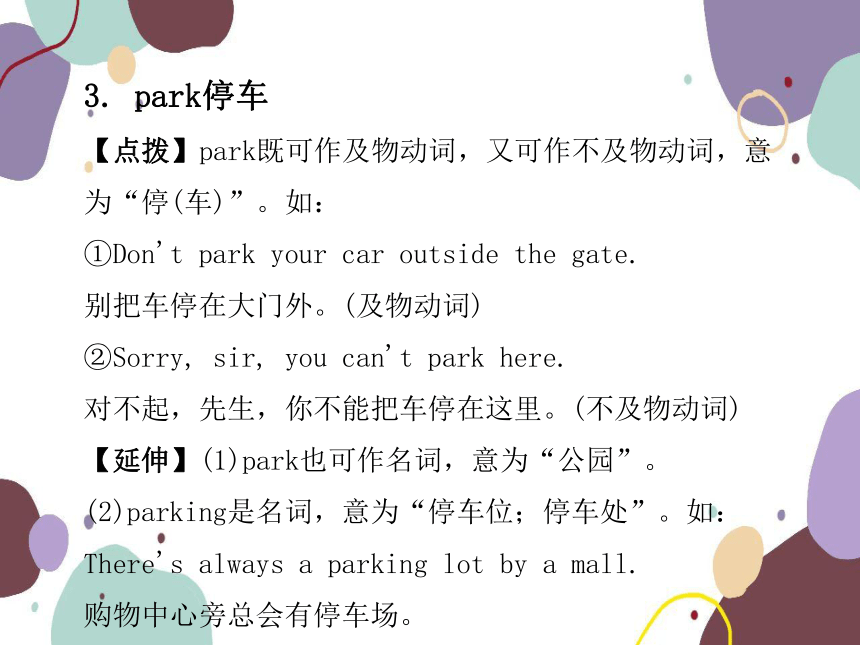人教版九年级全册Unit 3Could you please tell me wherethe restrooms are?(Section B 2a-2d)知识点课件(共19张PPT)
文档属性
| 名称 | 人教版九年级全册Unit 3Could you please tell me wherethe restrooms are?(Section B 2a-2d)知识点课件(共19张PPT) |  | |
| 格式 | pptx | ||
| 文件大小 | 239.9KB | ||
| 资源类型 | 教案 | ||
| 版本资源 | 人教新目标(Go for it)版 | ||
| 科目 | 英语 | ||
| 更新时间 | 2022-10-17 15:15:33 | ||
图片预览







文档简介
(共19张PPT)
Unit 3 Could you please tell me where
the restrooms are
Period 4(Section B 2a-2d)
教学目标 1. 学会如何选择恰当的语言2. 学会使用礼貌用语,并尊重他人,建立良好的人际交往关系3. 熟练运用“Could you please...”“Excuse me, I wonder if you can help me...”“Pardon me, could you please tell me where to...”
重点词汇 politely, request, direction, correct, polite, direct, speaker, whom, impolite, address, underground, parking lot, course
重点句型 ①It is important to know how to ask for help politely.②I wonder if you can help me.③Both are correct, but the first one sounds less polite.
难点 ①It might seem more difficult to speak politely than directly.②The expressions they use might depend on whom they are speaking to or how well they know each other.
1. polite, politely, impolite与impolitely
【点拨】这四个词的关系如下:
polite(adj.有礼貌的)+ly→politely(adv.有礼貌地)
反义词 反义词
impolite(adj.无礼的)+ly→impolitely(adv.无礼地)如:
①He speaks to everyone politely.
他对每个人说话都很有礼貌。
②It's not polite to laugh at others.
嘲笑别人是不礼貌的。
③It's impolite to cut in line.
插队是没有礼貌的。
④The rude man is speaking to his mother impolitely.
那个粗鲁的男人正在粗鲁地对他妈妈说话。
2. request 要求;请求
【点拨】作名词时,意为“请求”,是可数名词。如:
She refused all requests for an interview.
她拒绝了所有的采访请求。
【延伸】作动词时,意为“请求”。这时,其后可以跟名词、不定式的复合结构以及从句作宾语。尤其要注意,当从句作宾语时,从句谓语常用“(should)+动词原形”结构。
如:
①You have to request permission if you want to take any photos here.
如果你想要在这儿拍照的话,需要申请准许。
②We requested him to leave the room as soon as possible.
我们请求他尽快离开这个房间。
③I requested that he (should) leave.
我请求他离开。
3. park停车
【点拨】park既可作及物动词,又可作不及物动词,意为“停(车)”。如:
①Don't park your car outside the gate.
别把车停在大门外。(及物动词)
②Sorry, sir, you can't park here.
对不起,先生,你不能把车停在这里。(不及物动词)
【延伸】(1)park也可作名词,意为“公园”。
(2)parking是名词,意为“停车位;停车处”。如:
There's always a parking lot by a mall.
购物中心旁总会有停车场。
4. correct 正确的;恰当的
【点拨】correct 作形容词时,意为“正确的;恰当的”,相当于right,其副词形式为correctly。如:
①I can tell you the correct answer.
我可以告诉你正确答案。
②He answered the teacher's question correctly. 他正确地回答了老师的问题。
【延伸】correct 也可作及物动词,意为 “改正”。如:You must correct your mistakes.
你必须改正自己的错误。
5. direct 直接的;直率的
【点拨】direct 作形容词时,意为“直接的;直率的”, 其副词形式是directly, 意为“直接地”,其反义词是 indirect, 意为“间接的”。如:
①There is a direct flight to London at 13:00.
下午1点有直飞伦敦的航班。
②He is a direct person.
他是个直率的人。
【延伸】 (1)direct 还可以作动词,意为“导演;指挥;指引”。如:
①The film was directed by Zhang Yimou.
这部电影是由张艺谋导演的。
②Could you direct me to the station
你能告诉我去车站怎么走吗?
(2)还有两个派生词, direction,名词,意为“方向;方位”,常用词组:in the direction of sth. 朝着……的方向。director,名词,意为“导演;董事;负责人”。如:
①Some people have a very poor sense of direction. 有些人的方向感非常差。
②He is the main director of the movie.
他是这部电影的主导演。
1. It might seem more difficult to speak politely than directly.
似乎有礼貌地说比直接说更困难。
【点拨】(1)it 是形式主语,无意义,放在句首为避免头重脚轻,真正的主语是to speak politely。
(2)might是情态动词,表可能,指推测的不确定性,意为“有可能;也许会”,比may语气更委婉,可能性更小。
如:It might take me three days to finish the project.完成这个项目可能要花费我三天时间。
(3)句型It seems/seemed that... 意为“似乎/好像……”。如:
It seems that he is quite happy.
他似乎很高兴。
【延伸】seem用作连系动词,意为“好像;似乎”。常用结构如下:
(1)seem (to be)+形容词/名词/介词短语。如:
He seems (to be) very sad.他似乎很伤心。
(2)seem to do sth. 意为“似乎要做某事”。如:
Our team seems to win.
我们队好像要赢了。
(3)It seems as if...意为“看起来好像……”。如:
It seems as if it is going to rain.
天看起来好像要下雨了。
2. Sometimes we even need to spend time leading into a request.
有时,我们甚至需要花时间来引入一个请求。
【点拨】(1)need to do sth. 意为“需要做某事”,need此处用作实义动词,意为“需要”,其后接动词不定式作宾语。如:
You need to finish your homework first.
你需要先完成作业。
【延伸】need作实义动词的其他常见用法:
(1)need sth. 需要某物。如:
I need your help.我需要你的帮助。
(2)need sb. to do sth. 需要某人做某事。如:
We need you to work for us.
我们需要你为我们工作。
(3)need doing=need to be done某事需要被做,主语是物。如:
My bike needs repairing.=My bike needs to be repaired.我的自行车需要修理。
【点拨】(2)lead的用法:
lead的基本意义为“在前头引导”。如:
She leads me in/out.她领我进去/出去。
lead to意为“通往”。如:
This road leads to the train station.
这条路通往火车站。
【延伸】lead to还有“引起(结果等);导致”的意思。如:①The heavy rain led to a flood.
大雨引起了洪灾。
②Hard work leads to success.艰辛的工作通向成功。
【点拨】(3)spend time/money doing sth.意为“花费时间/金钱做某事”。如:
①I spent two hours reading the novel.
我花了两个小时读这本小说。
②I spent 100 yuan buying the sweater.
我花了100元买这件毛衣。
【辨析】spend, take, cost与pay
四者均用作动词,表示“花费”,但用法却不大相同。具体区别如下表:
spend 主语通常是人 (1)sb. spend(s) time/money doing sth. 某人花费时间/金钱做某事(2)sb. spend(s) time/money on sth. 某人在某事/某物上花费时间/金钱
take 常用it作形式主语 It takes sb. some time to do sth.做某事花费某人多长时间
cost 主语是物 sth. cost(s) sb. some money某物花费某人多少钱
pay 主语是人 sb. pay(s) some money for sth.某人为某物花费多少钱
如:①I spent one hundred yuan buying the present.=I spent one hundred yuan on the present.=The present cost me one hundred yuan.=I paid one hundred yuan for the present.
这礼物花了我100元。
②It took me 30 minutes to get to school.
我用了半个小时的时间到达学校。
③I spend some of my free time playing basketball for my school team.
我用一些空余时间为我的校队打篮球。
Unit 3 Could you please tell me where
the restrooms are
Period 4(Section B 2a-2d)
教学目标 1. 学会如何选择恰当的语言2. 学会使用礼貌用语,并尊重他人,建立良好的人际交往关系3. 熟练运用“Could you please...”“Excuse me, I wonder if you can help me...”“Pardon me, could you please tell me where to...”
重点词汇 politely, request, direction, correct, polite, direct, speaker, whom, impolite, address, underground, parking lot, course
重点句型 ①It is important to know how to ask for help politely.②I wonder if you can help me.③Both are correct, but the first one sounds less polite.
难点 ①It might seem more difficult to speak politely than directly.②The expressions they use might depend on whom they are speaking to or how well they know each other.
1. polite, politely, impolite与impolitely
【点拨】这四个词的关系如下:
polite(adj.有礼貌的)+ly→politely(adv.有礼貌地)
反义词 反义词
impolite(adj.无礼的)+ly→impolitely(adv.无礼地)如:
①He speaks to everyone politely.
他对每个人说话都很有礼貌。
②It's not polite to laugh at others.
嘲笑别人是不礼貌的。
③It's impolite to cut in line.
插队是没有礼貌的。
④The rude man is speaking to his mother impolitely.
那个粗鲁的男人正在粗鲁地对他妈妈说话。
2. request 要求;请求
【点拨】作名词时,意为“请求”,是可数名词。如:
She refused all requests for an interview.
她拒绝了所有的采访请求。
【延伸】作动词时,意为“请求”。这时,其后可以跟名词、不定式的复合结构以及从句作宾语。尤其要注意,当从句作宾语时,从句谓语常用“(should)+动词原形”结构。
如:
①You have to request permission if you want to take any photos here.
如果你想要在这儿拍照的话,需要申请准许。
②We requested him to leave the room as soon as possible.
我们请求他尽快离开这个房间。
③I requested that he (should) leave.
我请求他离开。
3. park停车
【点拨】park既可作及物动词,又可作不及物动词,意为“停(车)”。如:
①Don't park your car outside the gate.
别把车停在大门外。(及物动词)
②Sorry, sir, you can't park here.
对不起,先生,你不能把车停在这里。(不及物动词)
【延伸】(1)park也可作名词,意为“公园”。
(2)parking是名词,意为“停车位;停车处”。如:
There's always a parking lot by a mall.
购物中心旁总会有停车场。
4. correct 正确的;恰当的
【点拨】correct 作形容词时,意为“正确的;恰当的”,相当于right,其副词形式为correctly。如:
①I can tell you the correct answer.
我可以告诉你正确答案。
②He answered the teacher's question correctly. 他正确地回答了老师的问题。
【延伸】correct 也可作及物动词,意为 “改正”。如:You must correct your mistakes.
你必须改正自己的错误。
5. direct 直接的;直率的
【点拨】direct 作形容词时,意为“直接的;直率的”, 其副词形式是directly, 意为“直接地”,其反义词是 indirect, 意为“间接的”。如:
①There is a direct flight to London at 13:00.
下午1点有直飞伦敦的航班。
②He is a direct person.
他是个直率的人。
【延伸】 (1)direct 还可以作动词,意为“导演;指挥;指引”。如:
①The film was directed by Zhang Yimou.
这部电影是由张艺谋导演的。
②Could you direct me to the station
你能告诉我去车站怎么走吗?
(2)还有两个派生词, direction,名词,意为“方向;方位”,常用词组:in the direction of sth. 朝着……的方向。director,名词,意为“导演;董事;负责人”。如:
①Some people have a very poor sense of direction. 有些人的方向感非常差。
②He is the main director of the movie.
他是这部电影的主导演。
1. It might seem more difficult to speak politely than directly.
似乎有礼貌地说比直接说更困难。
【点拨】(1)it 是形式主语,无意义,放在句首为避免头重脚轻,真正的主语是to speak politely。
(2)might是情态动词,表可能,指推测的不确定性,意为“有可能;也许会”,比may语气更委婉,可能性更小。
如:It might take me three days to finish the project.完成这个项目可能要花费我三天时间。
(3)句型It seems/seemed that... 意为“似乎/好像……”。如:
It seems that he is quite happy.
他似乎很高兴。
【延伸】seem用作连系动词,意为“好像;似乎”。常用结构如下:
(1)seem (to be)+形容词/名词/介词短语。如:
He seems (to be) very sad.他似乎很伤心。
(2)seem to do sth. 意为“似乎要做某事”。如:
Our team seems to win.
我们队好像要赢了。
(3)It seems as if...意为“看起来好像……”。如:
It seems as if it is going to rain.
天看起来好像要下雨了。
2. Sometimes we even need to spend time leading into a request.
有时,我们甚至需要花时间来引入一个请求。
【点拨】(1)need to do sth. 意为“需要做某事”,need此处用作实义动词,意为“需要”,其后接动词不定式作宾语。如:
You need to finish your homework first.
你需要先完成作业。
【延伸】need作实义动词的其他常见用法:
(1)need sth. 需要某物。如:
I need your help.我需要你的帮助。
(2)need sb. to do sth. 需要某人做某事。如:
We need you to work for us.
我们需要你为我们工作。
(3)need doing=need to be done某事需要被做,主语是物。如:
My bike needs repairing.=My bike needs to be repaired.我的自行车需要修理。
【点拨】(2)lead的用法:
lead的基本意义为“在前头引导”。如:
She leads me in/out.她领我进去/出去。
lead to意为“通往”。如:
This road leads to the train station.
这条路通往火车站。
【延伸】lead to还有“引起(结果等);导致”的意思。如:①The heavy rain led to a flood.
大雨引起了洪灾。
②Hard work leads to success.艰辛的工作通向成功。
【点拨】(3)spend time/money doing sth.意为“花费时间/金钱做某事”。如:
①I spent two hours reading the novel.
我花了两个小时读这本小说。
②I spent 100 yuan buying the sweater.
我花了100元买这件毛衣。
【辨析】spend, take, cost与pay
四者均用作动词,表示“花费”,但用法却不大相同。具体区别如下表:
spend 主语通常是人 (1)sb. spend(s) time/money doing sth. 某人花费时间/金钱做某事(2)sb. spend(s) time/money on sth. 某人在某事/某物上花费时间/金钱
take 常用it作形式主语 It takes sb. some time to do sth.做某事花费某人多长时间
cost 主语是物 sth. cost(s) sb. some money某物花费某人多少钱
pay 主语是人 sb. pay(s) some money for sth.某人为某物花费多少钱
如:①I spent one hundred yuan buying the present.=I spent one hundred yuan on the present.=The present cost me one hundred yuan.=I paid one hundred yuan for the present.
这礼物花了我100元。
②It took me 30 minutes to get to school.
我用了半个小时的时间到达学校。
③I spend some of my free time playing basketball for my school team.
我用一些空余时间为我的校队打篮球。
同课章节目录
- Unit 1 How can we become good learners.
- Section A
- Section B
- Unit 2 I think that mooncakes are delicious!
- Section A
- Section B
- Unit 3 Could you please tell me where the restroom
- Section A
- Section B
- Unit 4 I used to be afraid of the dark.
- Section A
- Section B
- Unit 5 What are the shirts made of?
- Section A
- Section B
- Review of Units 1-5
- Unit 6 When was it invented?
- Section A
- Section B
- Unit 7 Teenagers should be allowed to choose their
- Section A
- Section B
- Unit 8 It must belong to Carla.
- Section A
- Section B
- Unit 9 I like music that I can dance to.
- Section A
- Section B
- Unit 10 You're supposed to shake hands.
- Section A
- Section B
- Review of Units 6-10
- Unit 11 Sad movies make me cry.
- Section A
- Section B
- Unit 12 Life is full of the unexpected
- Section A
- Section B
- Unit 13 We're trying to save the earth!
- Section A
- Section B
- Unit 14 I remember meeting all of you in Grade 7.
- Section A
- Section B
- Review of Units 11-14
